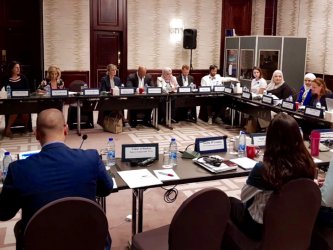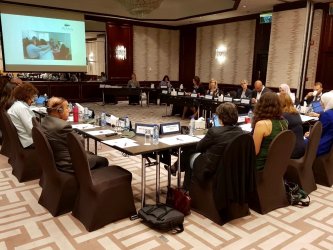-
Improved Human Security Measures to Counter Violent ...
Improved Human Security Measures to Counter Violent Extremism in Jordan, Lebanon, and Tunisia
The West Asia-North Africa (WANA) Institute gathered 20 stakeholders from Jordan, Lebanon, and Tunisia in Amman today to discuss its preliminary research findings emerging from a regional research project titled “Towards more effective human security approaches in Jordan, Lebanon, and Tunisia.”
Human security sees the individual as the main focus of security efforts, whereas the main objective of traditional security is state security. Human security approaches include health care provision, food and water security, political participation, women empowerment, employment and education.
Projects enhancing human security can contribute to countering violent extremism, since the most effective way to maintain security is by addressing the underlying causes of conflict: lack of development, opportunities, and rights.
However, the main policy goal today seems to be to prevent immediate security incidents, which narrows the space for people-centred human security approaches. This particularly affects vulnerable groups as less attention is devoted to their development. Such policy responses contradict recent research on radicalisation which attributes an important role to local communities in countering extremism.
Reconceptualising Human Security
According to Dr Neven Bondokji, the Human Security Team Leader and Senior Researcher at the WANA Institute, this research will allow the WANA Institute to produce evidence on the effectiveness of human security approaches in promoting security, conflict resilience and countering violent extremism from a regional perspective.
The project will also gather community stakeholders, security policy-makers and development-humanitarian practitioners to develop improved human security approaches that better respond to the new threats.
In addition to desk research, the researchers are carrying out field research targeting 1422 individuals in 18 communities in Jordan, Lebanon, and Tunisia. They will hold 162 stakeholder interviews, 36 one-day workshops, 18 focus group discussions with marginalised individuals vulnerable to recruitment by extremist groups, and 3 national policy labs gathering community stakeholders, security policy-makers and development practitioners.
This project is led by the WANA Institute, funded through the Netherlands Organisation for Scientific Research (NWO-WOTRO), commissioned by the Ministry of Foreign Affairs of The Netherlands, and developed in close collaboration with the Knowledge Platform Security & Rule of Law. Consortium partners in Jordan are the Arab Institute for Security Studies and Mercy Corps.


